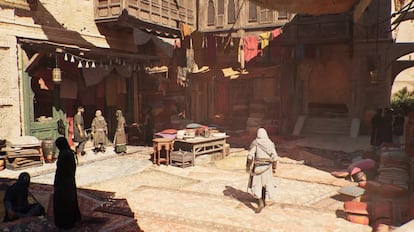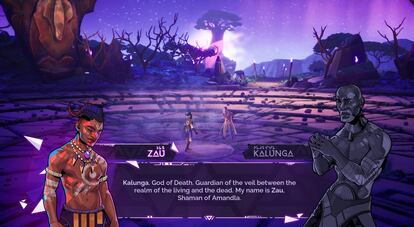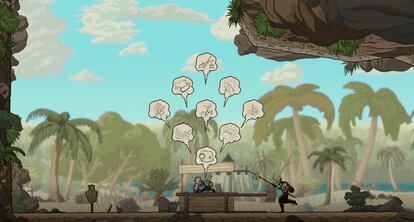At the age of 17, Diego Rodríguez-Ponga first dreamed of making a video game about the conquest of Mexico. Fifteen years later, the title is about to see the light of day: Plus Ultra: Legacy, which recounts the clash between Spanish and Mesoamerican explorers five centuries ago. Although the story of the work is invented (the protagonist, Don Juan, is a Spanish explorer who arrives in the Veracruz of the conquest to arrest Hernán Cortés, whom the Crown sees as a traitor), it makes the most of the contextual possibilities to explain the story. Mexican conquest, the struggles between the Aztecs and the Mexica, or the importance of figures less known than Cortés or Moctezuma but equally important, such as the Afro-Spanish Juan Garrido, or the soldier María de Estrada. “There are video games that teach a lot. “They taught me a lot when I was a student, in addition to reinforcing my love for history,” says Professor Alejandro Rodríguez de la Peña, professor of Medieval History at the CEU San Pablo University and writer. Digital entertainment aside, the launch of Legacy exemplifies one of the branches with the most potential of this type of leisure: disseminating historical lessons through the recreation of the past.
“Everything arises from the idea of transmitting the love of history through a video game,” says Rodríguez-Ponga (Madrid, 31 years old) about Legacy. The work, in two dimensions, mixes action and exploration in what is known as genre metroidvania. “These types of games usually have an atmosphere of claustrophobia and darkness. I wanted to get away from that, because it doesn’t do justice to the colorful Mexico that we wanted to narrate,” notes its creator. Games of this genre, which do not usually have hyper-realistic graphics, make visual style crucial. For Legacy, Rodríguez-Ponga and his team have opted for an aesthetic similar to clear-line comics, which pairs very well with the very colorful proposal they have developed. “Any game has to enter through the eyes,” says Rodríguez-Ponga, who is very clear about his influences: Super Metroid, Machinarium, Hollow Kinght or Spanish Blaphemous.
These are his artistic references, because the underlying theme (the union of Spain and Mexico) has touched him closely since he was born: due to the work of his parents, his brother, Alfonso, was born in 1988 in the Mexican capital. Together (Alfonso directs the financial part) they are the soul of the game development company: Póntica. After the pandemic, Rodríguez-Ponga began working on this project, almost obsessively, in his free time. He convinced a handful of small investors, who allowed him to shape the company until they made it official in 2021. For Legacy They have gotten involved in a crowdfunding campaign: they asked for 25,000 euros and they have far exceeded 130%. New ones will be able to be added to the six permanent workers in the company, now that the game is guaranteed.
One of the most unique features of the game is that it will be translated into Nahuatl. “Tlascaltecas and Mexicas end up converting Nahuatl into the vehicular language of Mexico, which skyrockets at the time of the conquest,” says Rodrígez-Ponga. “Promoted by the Spanish, Nahuatl ends up having a printed grammar before English or German. When Mexico became independent, in 1821, 60% of the population spoke Nahuatl,” he adds. This translation is one of the best recent examples of the union between leisure and history that can occur in a game.
Misgivings in the academy
“In general, the academic world continues to turn its back on video games, they are stigmatized as mere leisure and not as a form of learning. It is forgotten that the leisure In the Western tradition it is an integral part of cultural life, as seen in the educational role of gymnastic activities in the classical world or chess and tournaments in the medieval world,” says Professor Rodríguez de la Peña.
“Sagas like Age of Empires o Assassin´s Creed, Although devoid of historical rigor in their narrative, they make a display of truthfulness in everything related to the setting of their settings. Constantinople or Florence Assassin´s Creed They are a good example of this. He Civilization by Sid Meier allows a person without much historical knowledge to understand the growth process of a civilization from its origins. But, above all, I value some strategy video games that are so well documented and executed that they are a valuable instrument for learning history, geopolitics or military tactics,” he explains. “All the games from the Paradox factory are extraordinary, but they deserve special mention European y Crusader Kings for the richness of its interface and the rigor of its historical setting.”

To the classics that for decades have fed players with historical lessons, in recent years games have been added that dealt with specific moments with great precision: feudal Japan (Rise of the Roninto the saga Shogun, Ghost of Tsushima), medieval Europe (Kingdom Come), World War I (Valiant Hearts) or classical Rome (the saga Caesar). Many of these games do not make a very accurate historical reconstruction by chance, but it is increasingly common for teams to add historians to their squads to advise when adjusting to the past. By budget and scale, the saga of Assassin’s Creed (with games based on ancient Egypt, England attacked by Vikings, the Florentine Renaissance, ancient Greece or 9th century Baghdad) is among the most notable.
Bantu mythology
“All my life I have liked games. Even in my work as an actor, I have always taken some reference from them,” says Abubakar Salim (Hertfordshire, 31 years old), a British performer of Kenyan descent. Salim worked as an actor in Assassins Creed Origins and for that he was nominated for the Bafta. “Thanks to that nomination I got to know the industry behind the scenes, and that was where my fascination with telling stories through games began.”

“I think video games and culture are already very united,” says Salim, creator of one of the most talked about works this year: Tales of Kenzera: ZAU, a game in which Bantu mythology is deepened and transmitted. “Bantu legends have the same purpose as Greek, Norse or Indian myths: to share stories that help us learn and grow as human beings. The difference, however, is that they cover a large number of different tribes, which means many different perspectives, so ultimately there are many lessons to be learned from them,” he says. Yeah Legacy It will be translated into Nahuatl, WIDE follow that bet: it is perfectly dubbed into Swahili.
“For me, it was important to reflect this in WIDE because they are the stories that my family, specifically my father, told me. Through my grandfather’s stories I learned those of my ancestors. Also, when I worked on the series Raised By Wolves, I got to know another facet of South African storytelling and myths (we filmed in Cape Town). These stories are so powerful and rich, and so community-driven, that it was crucial to include them in the journey of WIDE”.
Languages, landscapes, cultures, architectures, urban planning, stories. There are all kinds of video games, of course, but a good part of them represent “an intellectual challenge for students,” in the words of Professor Rodríguez de la Peña. A type of video game, many of them with a historical background, that are “complex because they require time, attention and study” and that, deep down, exemplify a way of learning that will grow in the future. As the professor says: “The healthy part of the video game world will end up being part of the culture in its own right.” At the time.
Subscribe to continue reading
Read without limits
_

